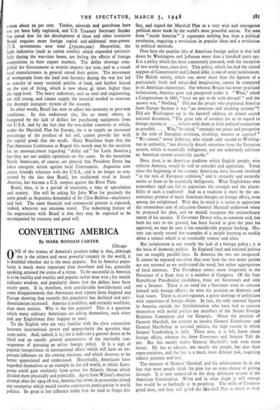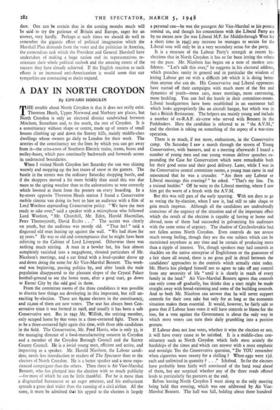CONVERTING AMERICA
By MARK BONHAM CARTER Chicago
0 NE of the ironies of America's position today is that, although she is the richest and most powerful country in the world, it is doubtful whether she is the most popular. Yet in America popu- larity is much more _important than elsewhere and has, generally speaking, attained the status of a virtue. To be successful in America is to be healthy and wealthy and popular rather than wise ; for wealth indicates wisdom, and popularity shows that the dollars have been wisely spent. It is, therefore, with considerable bewilderment and some disappointment that Americans read reports from England and Europe showing that recently this popularity has declined and anti- Americanism increased. America is healthier, and certainly wealthier, than most nations. Why is she less popular? This is a question which many ordinary Americans are asking themselves, each other and any Englishman they happen to meet.
To the English who are very familiar with the close connection between international power and unpopularity the question may seem naive. And, indeed, it is ; for it indicates a general desire to be liked and an equally general unawareness of the inevitable con- sequences of pursuing an active foreign policy. It is a sign of popular inexperience in international affairs which will have an im- portant influence on the coming elections, and which deserves to be better appreciated and understood. Historically, Americans have regarded themselves as an example to the old world, at which Euro- peans could gaze enviously from across the Atlantic Ocean which divided them physically and politically. Apart from Wilson's abortive attempt after the 1914-18 war, America has never in peace-time joined any enterprise which would involve continuous participation in world politics. So great is her influence today that we tend to forget this fact, and regard the Marshall Plan as a very wise and courageous political move made by the world's most powerful nation. Yet seen from "inside America" it represents nothing less than a political revolution, requiring a revolution in popular ideas and a revolution in political methods.
Over here the popular idea of American foreign policy is that laid down by Washington and Jefferson more than a hundred years ago. It is a policy which has been consistently pursued, with the exception of two world wars, since then. This policy, which has had the united support of Conservative and Liberal alike, is one of strict isolationism. The British variety, which was never more than the figment of a particularly lively and misguided imagination, cannot be compared to its American counterpart. For whereas Britain has never practised isolationism, America grew and prospered under it. " What," asked a Congressman in 1867, "have we got to do with abroad? " and the answer was, " Nothing." Did not the people who populated America leave Europe because it was "an atrocious and insulting tyranny "? Did not Washington say in his farewell address, an almost sacred national document, " The great rule of conduct for us in regard to foreign nations is . . . to have with them as little political connection as possible. . . . Why," he asked, " entangle our peace and prosperity in the toils of European ambition, rivalship, interest or caprice? " " We cannot," wrote Jefferson, who stands only second to Washing- ton in authority, " too distinctly detach ourselves from the European system, which is essentially belligerent, nor too sedulously cultivate an American system essentially pacific."
Here, then, is an American tradition which English people, who criticise America, would do well to consider and appreciate. Twice since the beginning of the century Americans have become involved " in the toils of European ambition," and it certainly and naturally seems to them to be essentially belligerent. What Englishman who remembers 1938 can fail to appreciate the strength and the plausi- bility of such a tradition? And as a tradition it must be the un- conscious premise of much American thought on foreign affairs, even among the enlightened. With this in mind it is easier to appreciate the tremendous task of education General Marshall undertook when he proposed his plan, and we should recognise the extraordinary extent of his success. If Governor Dewey who, as someone said, has both his ears to the ground, has been forced to give the plan his approval, we may be sure it has considerable popular backing. His- tory can surely record few examples of a people learning so readily about a subject which is so essentially remote and alien.
But isolationism is not merely the lack of a foreign policy ; it is the basis of domestic politics. In England local and national politics run on roughly parallel lines. In America the two are integrated. It cannot be repeated too often that over here the two major parties are not national as we understand the word, but rather aggregations of local interests. The Presidency comes more frequently to the Governor of a State than to a member of Congress. Of the four Republican Presidential candidates, three are Governors and only one a Senator. There is no need for a Governor even to concern himself with foreign affairs ; he wins his position on domestic and local issues. There is, in consequence, a grave shortage of politicians with experience of foreign affairs. In fact, the only national figures in America outside the Administration who have had to concern themselves with world politics are members of the Senate Foreign Relations Committee and the Generals. Hence the position of General Marshall, the attempt to involve General Eisenhower and General MacArthur in national politics, the high esteem in which Senator Vandenberg is held. These men, it is felt, know about foreign affairs, whereas the three Governors and Senator Taft do not. But this merely makes General Marshall's task even more heroic. He has to educate, not merely the people, but also their representatives, and the last is a much more delicate task, requiring infinite patience and tact.
The measure of General Marshall and his achievement lie in the fact that most people think the plan has an even chance of getting through. It is now enmeshed in the deep defensive system of the American Constitution. When and in what shape it will emerge few would be so foolhardy as to prophesy. The mills of Congress grind slow, and they will grind the Marshall Plan as much as they
dare. One can be certain that in the coming months much will be said to try the patience of Britain and Europe, eager for an answer, very hardly. Perhaps at such times we should do well to remember the gigantic effort of political imagination which the Marshall Plan demands from the voter and the politician in America, the tremendous task which the President and General Marshall have undertaken of making a huge nation and its representatives re- orientate their whole political outlook and the amazing extent of the success they have already achieved. If the English reaction to such efforts is an increased anti-Americanism it would seem that our sympathies are contracting as theirs expand.































 Previous page
Previous page